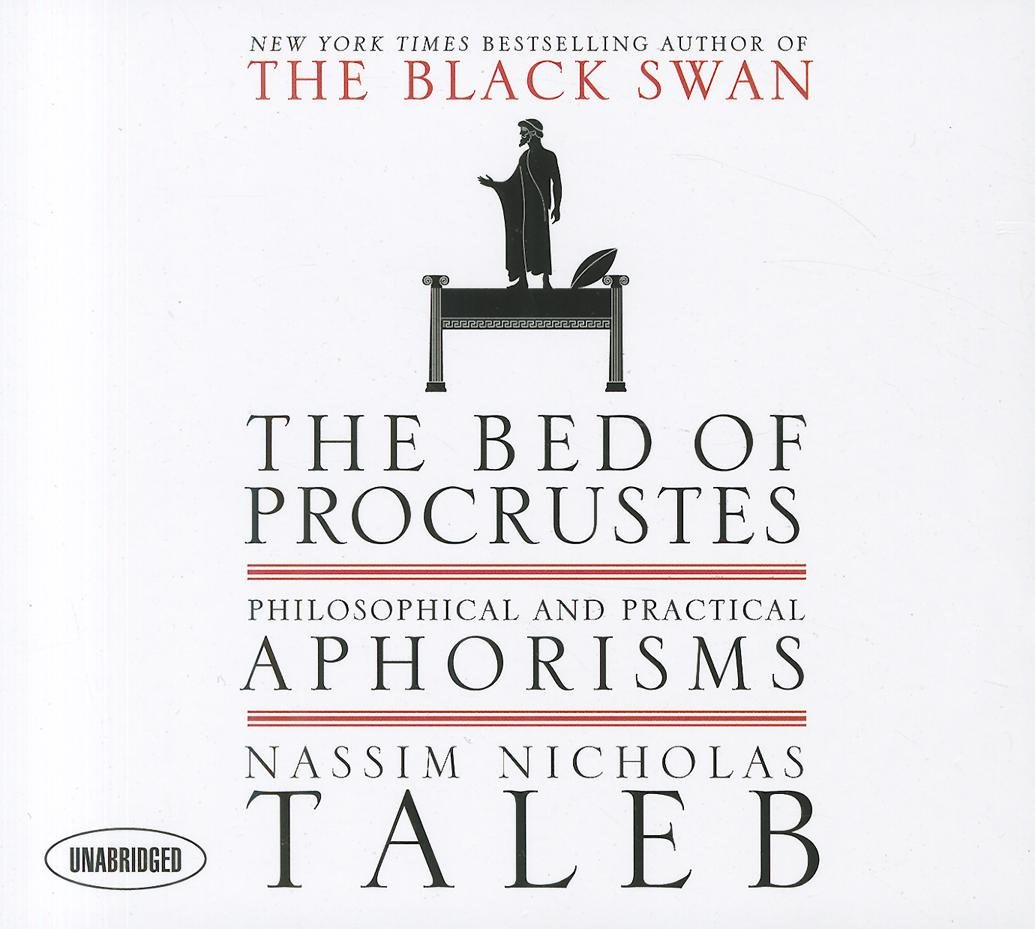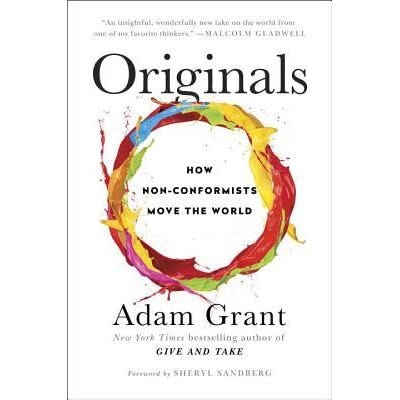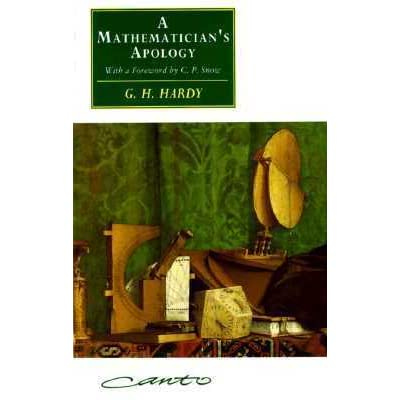15: What makes an original; The bed of procrustes; and more..
Hey friends, hope the day fins you well. Here are my notes:
Review of The bed of Procrustes:

In this short(very long) book, Taleb likens The modern way of thinking to the bed of procruste. As the ancient myth goes, Procruste doggedly believed that he can fit all of his guests in his one size fits all bed, by either stretching them or amputating their limbs. Before long, this method of dealing with guests backfired, and, in order to be fitted in his own bed, procrustean had his head cut clean off his body by non other than Thesus. Taleb argues that the procrustean bed is what describes most of how modernity operates. We fit humans into narratives,economies into economic ideas, the uncertain world into our limited mental models. We created novel ideas designed to numb the mind like employement, journalism, and media. We adapt humans to our technologies instead of the reverse. We get fooled by randomness when randomness doesn't exist. We refuse to acknowledge the limitedness of our knowledge, and we make science has the final word, even for things behind the veil of opacity. Taleb compresses his understanding of the world into compact nuggets of poetic, counterintuitive aphorisms. You read one aphorism and then a light goes off in your head; why did i not think of it this way before? You'd tell yourself. Take for instance this aphorism: "they call detecting patterns intelligence, I call intelligence avoiding false patterns", or this one: you're a fool if you don't take advantage( make profts) of what complaints, flaws,and wrongs you see in society". Taleb espouses the reductionist frame of mind: Know what not to consume, what to ignore, learn by substraction; learn what not to do, have anti-models,people you don't wanna be like,and on and on..
There are a lot of aphorisms that are worth taking the time( slowwalk+reasoning) to soak up so that the veil of opacity gets lifted for you if only momentarily. Taleb values 3 qualities in a human: erudition, elegance, and courage.
Review of Originals:

In the book Outliers, Malcolm Gladwell concludes that outliers are not actually outliers. The right circumstances made them earn that title which society places on a pedestal, away from the ordinary's reach. In this book, a similar conclusion can be deduced. Originals are not actually originals. Originality is an emergent property. It is just ordinary people applying unpopular strategies.
Adam Grants defines several qualities that he thinks make an original:
1-An original is someone who questions the status-quo. He's aware that everything around him,the default, was made by erring humans, and it is possible that we could imagine a better way of doing things.
2- An original pursues a wide range of disciplines and immerse him or herself in different cultures for, they knows that to be original, is to be open and inspired by any field or culture out there.
3- Originals seek feedback from peers, not from managers or outsiders. Originals exist mostly at the middle of the organization, where people are most open to new ideas.
4- Originals don't take uncalculated risks. They have balanced risk portfolios. Most of the founders who dropped out of college to pursue businesses didn't do so until they guaranteed success.
5- Originals focus on turning their enemies into friends. Frenemeies or friends don't make the best allies.
6- To produce original ideas, originals produces a lot of ideas.
7- When judging ideas,originals spend time to first generate ideas of their own.
8-Originals seek dissenting opinions.
9- Originals exit a frustrating situation if they can't affect change,or if they can, they voice their concerns and change the situation.
10- Originals are not first-movers. They only venture into a new market when they've assessed a successful market and identified where they can make things better. Timing is crucial for them.
11- Procrastination is actually beneficial for your ideas to incubate. Before making a decision, you wait and let things run in the back burner of your mind to explore all possible suggestions.
12- Originals don't fall prey to fixed habits of thought. Throughout their careers, they're always testing new ways of doing things to escape the prison of their past accomplishments or what have you.
13- To present their new ideas to the world, they use familiarity( repetition), or they couch their ideas in old ones. As they did with the Lion king pitch: Hamlet with lions.
As for how parents could raise originals, Adam suggests that to institute change in children behaviors, parents should concentrate on praising character as opposed to action, shedding lights on how what they do affect other's feelings,let children internalize values by talking about what it means to them, introducing them to different role models, and giving them autonomy in choosing their own.
Leaders foster originality by welcoming diversity and adopting an idea meritocracy system where the best ideas win regardless of where they come from.
Overall, an insightful book that challenged some of my preconceptions about what makes an original and armed me with some new tools i can now wield in taking the hard path of originality, that of short term pain and long term meaning. Thinking about the negatives, only a few minutes dispersed throughout the book of finding the story dragging a bit come to mind. Can't think of anything else.
I highly suggest reading at least the actions for impact part at the end of the book. Pretty serviceable.
Review of A mathematician’s apology:

A mathematician at the end of his career contemplates his professional life and the value of Mathematics, what it is and what it isn't. He goes through a list of arguments and criticisms about his profession: Aging and the deterioration of the mind's ability to produce original ideas. Mathematicans are superior to people from other fields in so far as the theorems and work they produce are rife with ideas, as opposed to poetry and literature where, taken apart, the consitituents don't make for good ideas, but only if taken as a whole. Mathematics is defined by its beauty and seriousness. If we can't see the beauty of Mathematics in as simple a theorem as Euclid's prime numbers, or rational numbers, we're incapable of seeing the beauty of all mathematics. Mathematicians names are immortal, provided they're first-rate mathematicians, like the ancient greeks, say. The author asserts the futility of advanced mathematics in the sense that it doesn't add value to people's material gains, or relieve suffering. He laments how his life's work value was nil. What he did was only teach other students to do the same thing. He may have helped add some knowledge to humanity's trove,but it might not be useful. The author talks about how mathematicians are more poised to understand reality as opposed to the reality physicists deal with. The author seems to have been authentic, for, if we didn't count the many apologies he'd made on his part defending mathematics, most of the book, he was criticizing his life's choices and the significance of what he'd done.
This book has made me appreciate Mathematics more and think twice about what my talent is and how I can apply it to work that add the most value.
George Hotz: Hacking the Simulation & Learning to Drive with Neural Nets:
What programming languages should I learn? There are three paradigms:
+ learning in chronological order( imperative)
Assembly
C
Python
+ Functional hardware (2nd paradigm)
Learn Verilog
+ Programming 2.0:
Learn Pytorch( ML)
You will never learn Programming by watching a video about programming. The only way to learn programming is to have something you want to do, then trying to do it. By keep pushing on a project. Go program!
We need to start using AI as an assistant instead of it using us. In the 1900s literacy= reading n writing. In the 2000s you had to know computer programs, but from now on, you also need to learn video creation. Communication via video is crucial in an era where all our communications are taking that path.
Bret Victor, The future of programming:
The main message of the talk: If you are a creator, you should never say that i know what i am doing. Once you think you know what you're doing,you stop looking for new ways of doing things and useful ideas go right over your head as what happened to the binary coders got defensive when introduced to a new way of coding. Adopting new technologies is easy, but adopting new ways of thinking is hard for people. Tech advances faster than humans can adapt their thinking. . Bret victor makes it so that his talk is in the year 1973, he talks about all the amazing work in the field of computers that is happening and how 40 years from now the future will be interactive; mainly these 4 ideas:
Coding: direct manipulation of data
Procedures: goals and constraints
Text dump: spatial representations
Sequential: concurrent
But obviously the opposite happened. A clever way of critiquing our ways of doing business.
The WHO: John Oliver finds it ill-advised for the US to leave the WHO amid a global pandemic. He'd rather the US fixed its problems with WHO that eradicated smallpox and about to eradicate Polio. Only an international organization could have pulled that off, he argues.
Explosive bat in slow motion:
Dustin goes all the way to Alabama to film with his phantom camera and explain the mechanics of a bat made by an engineer, which fires through 4 cartridges upon getting hit by the ball. Interesting stuff.
Daniel Gross,How to win:
Treat yourself as an athlete. Sleep, eat healthy, exercise in order to achieve peak performance. System thinking. See your self from 3d person shooter to unlock emotionally. Iterate constantly to improve. Be curious of others.
Great insights from Patrick Collison about how to run your buisness.
Until next week.


